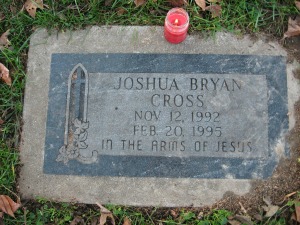God in the Dock: Tragedy and Trilemma
by Dr. Bryan Cross
Filed under The Problem of Evil
The day after my son Joshua died, after the necessary funeral and burial arrangements had been made, I got into my car, drove aimlessly some distance, and finally parked in a relatively desolate place away from traffic, noise, and people. I turned the car off and began to talk out loud to God, but at a volume more accurately described with the term 'yell.' "Why? Why him? He had done absolutely nothing wrong. He most certainly didn't deserve this. He suffered so much over these last two years. How could you let this happen? How could you just watch this happen, right in front of your omniscient view? How could you have just watched all this happen this whole time, silently, as from a distance, and done absolutely nothing? Nobody I know with even a shred of moral decency would do such a thing! Why didn't you do something to help him, to heal him? Why even bring him into the world, only to allow him to suffer so much, and then give him no chance to grow up, not even a chance to enjoy childhood? Why? How could you possibly be good and just, and allow an innocent child to suffer and die in this way?" In my anger and grief, as I hurled these questions at God I was repeatedly pounding my fist on the center of the steering wheel.
 Then at some point while still pounding on the wheel and repeatedly interrogating God with no reply forthcoming, a kind of trilemma began to form in my mind, and I gradually realized that under each of its three horns what I was doing was silly and pointless. Either God did not exist, or God was evil, or God was good. In what I had witnessed in Joshua's suffering, any God who was morally indifferent or 'neutral' or apathetic was just evil. If God did not exist, my complaining was silly and pointless, because in that case nobody was listening. And if God were evil, then my complaints were also silly and pointless, because there would be no point complaining to an evil deity about ill treatment, since if he were evil he wouldn't care about failing to be good. I realized by this process of reasoning that my act of complaining to God about an injustice could only make sense if God is good. But then, of course, if God, being God, is good not by participation in goodness or by derived goodness, but as Goodness itself (ipsum bonum), then my act of complaining to Him also did not make sense because in that case He certainly has a good reason for allowing my son's suffering and death to happen, a reason I cannot presently see. I would be complaining to Goodness itself about its behavior, as though I know Goodness better than Goodness knows Goodness, and as though I know better than Goodness how Goodness ought to run things. And that too would be silly and pointless (and arrogant), because one can't show up Goodness by appealing to Goodness. Any attempt to do so only shows up one's own insufficient understanding of Goodness, and is thus self-refuting. The proper response, if God is Goodness, would not be to rail against Him but instead to trust Him, even if I never found out the good, justifying reason for Joshua's death, even if for the rest of eternity I never could find out that reason because it was so far above my finite comprehension.
Then at some point while still pounding on the wheel and repeatedly interrogating God with no reply forthcoming, a kind of trilemma began to form in my mind, and I gradually realized that under each of its three horns what I was doing was silly and pointless. Either God did not exist, or God was evil, or God was good. In what I had witnessed in Joshua's suffering, any God who was morally indifferent or 'neutral' or apathetic was just evil. If God did not exist, my complaining was silly and pointless, because in that case nobody was listening. And if God were evil, then my complaints were also silly and pointless, because there would be no point complaining to an evil deity about ill treatment, since if he were evil he wouldn't care about failing to be good. I realized by this process of reasoning that my act of complaining to God about an injustice could only make sense if God is good. But then, of course, if God, being God, is good not by participation in goodness or by derived goodness, but as Goodness itself (ipsum bonum), then my act of complaining to Him also did not make sense because in that case He certainly has a good reason for allowing my son's suffering and death to happen, a reason I cannot presently see. I would be complaining to Goodness itself about its behavior, as though I know Goodness better than Goodness knows Goodness, and as though I know better than Goodness how Goodness ought to run things. And that too would be silly and pointless (and arrogant), because one can't show up Goodness by appealing to Goodness. Any attempt to do so only shows up one's own insufficient understanding of Goodness, and is thus self-refuting. The proper response, if God is Goodness, would not be to rail against Him but instead to trust Him, even if I never found out the good, justifying reason for Joshua's death, even if for the rest of eternity I never could find out that reason because it was so far above my finite comprehension.
I realized further that if God did not exist, or if God were evil, not only was my complaining pointless, I would never see Joshua again. My only hope to see him again lay under that third option, namely, that God is good. If in my anguish I were to turn against God, or deny His existence, I would cut myself off spiritually, mentally, emotionally, ontologically, and eschatologically, from the only possible way I could see Joshua again, and the only possible condition under which his life and suffering had been meaningful, worthwhile, and ultimately redeemable as truly good and not ultimately pointless or his suffering gratuitous. Of course that logical truth did not entail that God exists and is good. But I knew that I was not the ultimate source of the goodness and justice to which I was appealing in my complaint to whichever higher being was in charge. The only intelligible option of the three was that the goodness I longed for, and which inasmuch as I was aware of it was the fire behind the anger driving me to pummel the center of my steering wheel, was the very goodness at the heart of all things, the goodness by which I lived and breathed at that moment, and by which Joshua had lived and breathed, and breathed his last breath by my side the day before. And then the great inversion grew clearer to me. I had been yelling and railing at Goodness for His alleged lack of goodness, and all along Goodness had been giving me life, breath by which to yell, and even a little glimpse of itself such that I could make my complaint by appeal to what I knew of it by that glimpse. He who is Goodness itself all along had been looking me in the eyes, reaching into the center of my grieving soul, and embracing me with the gift of infinite love.
Then I rested my head on the steering wheel, and the tears began to pour down. I decided to trust God regarding Joshua's death, to trust that He had a justifying reason, such that Joshua's life and suffering were entirely worthwhile, even though I may never be able fully to understand that reason, either in this life or the next. This act of trust was based entirely on the thesis that the underlying source of all things is not evil, not indifferent, but is rather bonitas pura (i.e. pure goodness), the very source of the goodness I knew, and the ultimate object of the goodness for which I hoped. This thesis alone, of the three, made intellectual room for my tears, and made sense of my grief and anger, even while calling me to trust. The other two theses of the trilemma held me aloft above all reality, like Descartes's mind aloft above his body, forcing me to 'discover' what didn't exist before and under me, and thus destroying that very law by which I made my case against God on behalf of Joshua's suffering and death. Here, however, in the embrace of bonitas pura, my case against God could fail delightfully, not by knocking out its fundamental principle, but by the principle's perfection overflowing beyond the present limits of my perception and beyond the limits of what I could conceive in my present condition. If bonitas pura is the source behind and beneath all things, then Joshua's life, his suffering, and his death, all have genuine justifying and redeeming worth; they were worth it. His life was not in vain. His life was still ultimately a great gift to him, to my wife and me, and to the world. I could not out-wish or out-hope or out-plan bonitas pura. If my wishes, hopes, and plans for Joshua were good, a fortiori those of bonitas pura for my son were far better.
 This conclusion sank deeply into my soul, like a ship scuttled, sinking slowly and silently onto the ocean floor, never again to be moved. After the debris had settled some time later, I raised my head, wiped my eyes, started my car, drove home, and prepared to receive visitors and family from out-of-town for the funeral. But this conclusion resting on the sea floor of my soul did not shelter me from grief in the days to come. At the cemetery, as his small casket was being lowered into the ground, the pain of grief, loss, and separation, so overwhelmed me that I passed out. The next thing I knew, I was sitting in the driver's seat of my car, the seat reclined. My grandfather was standing beside the open car door. He looked at me and said, "Don't feel bad about passing out. Your great-grandfather passed out at the cemetery when my brother was being buried." Even though it did not keep grief from me, the truth that God is pure goodness allowed me to recover slowly through the grief over the weeks and months that followed. Grief did not crush me, because in every shadow of bereavement I found comfort in the truth that death is not the last word, that in my flesh I shall see the God who is bonitas pura.
This conclusion sank deeply into my soul, like a ship scuttled, sinking slowly and silently onto the ocean floor, never again to be moved. After the debris had settled some time later, I raised my head, wiped my eyes, started my car, drove home, and prepared to receive visitors and family from out-of-town for the funeral. But this conclusion resting on the sea floor of my soul did not shelter me from grief in the days to come. At the cemetery, as his small casket was being lowered into the ground, the pain of grief, loss, and separation, so overwhelmed me that I passed out. The next thing I knew, I was sitting in the driver's seat of my car, the seat reclined. My grandfather was standing beside the open car door. He looked at me and said, "Don't feel bad about passing out. Your great-grandfather passed out at the cemetery when my brother was being buried." Even though it did not keep grief from me, the truth that God is pure goodness allowed me to recover slowly through the grief over the weeks and months that followed. Grief did not crush me, because in every shadow of bereavement I found comfort in the truth that death is not the last word, that in my flesh I shall see the God who is bonitas pura.
Awareness that bonitas pura underlies all things changes one's stance toward reality. Faith then is not a blind leap, but a trust in One who is utterly and infinitely trustworthy. It stands in contrast to the stance of fear and despair that follow from a metaphysic in which indifference or evil is thought to be the source of all. Ultimately, is bonitas pura behind and under and surrounding all things, such that I can rest everything on it and let go in peaceful trust when death comes to me, or is reality indifferent or out to get me, such that I must fight against nature's blood-thirsty hunger game as long as I can, even though ultimately my fight is a losing and meaningless battle? On that day after my son's death, as I sat in the car struggling to make sense of what had just happened, I found within myself a kind of language of goodness, justice, and hope, a language not merely of words, but intelligible only as an ontological resonance with the bonitas pura at the center of all things, and unintelligible apart from it. As this bonitas pura so exceeds our comprehension, so by resting in its embrace through faith we can possess what the Apostle Paul referred to as a peace that surpasses all our understanding (Philippians 4:7), and what the Apostle Peter called an "unspeakable joy" (1 Peter 1:8).
"Question the beauty of the earth, question the beauty of the sea, question the beauty of the air, amply spread around everywhere, question the beauty of the sky, question the serried ranks of the stars, question the sun making the day glorious with its bright beams, question the moon tempering the darkness of the following night with its shining rays, question the animals that move in the waters, that amble about on dry land, that fly in the air; ... question all these things. All respond, "See, we are beautiful." Their beauty is their confession. Who made these beautiful changeable things, if not unchangeable Beauty?" (St. Augustine, Sermon 241)
Happy twenty-first birthday, son.
Related Posts
Note: Our goal is to cultivate serious and respectful dialogue. While it's OK to disagree—even encouraged!—any snarky, offensive, or off-topic comments will be deleted. Before commenting please read the Commenting Rules and Tips. If you're having trouble commenting, read the Commenting Instructions.













